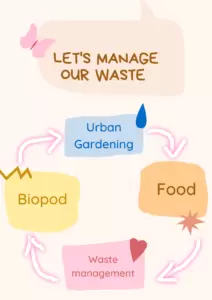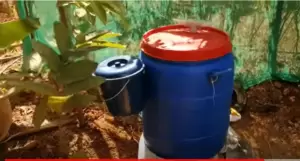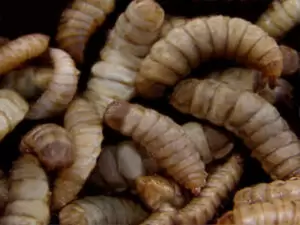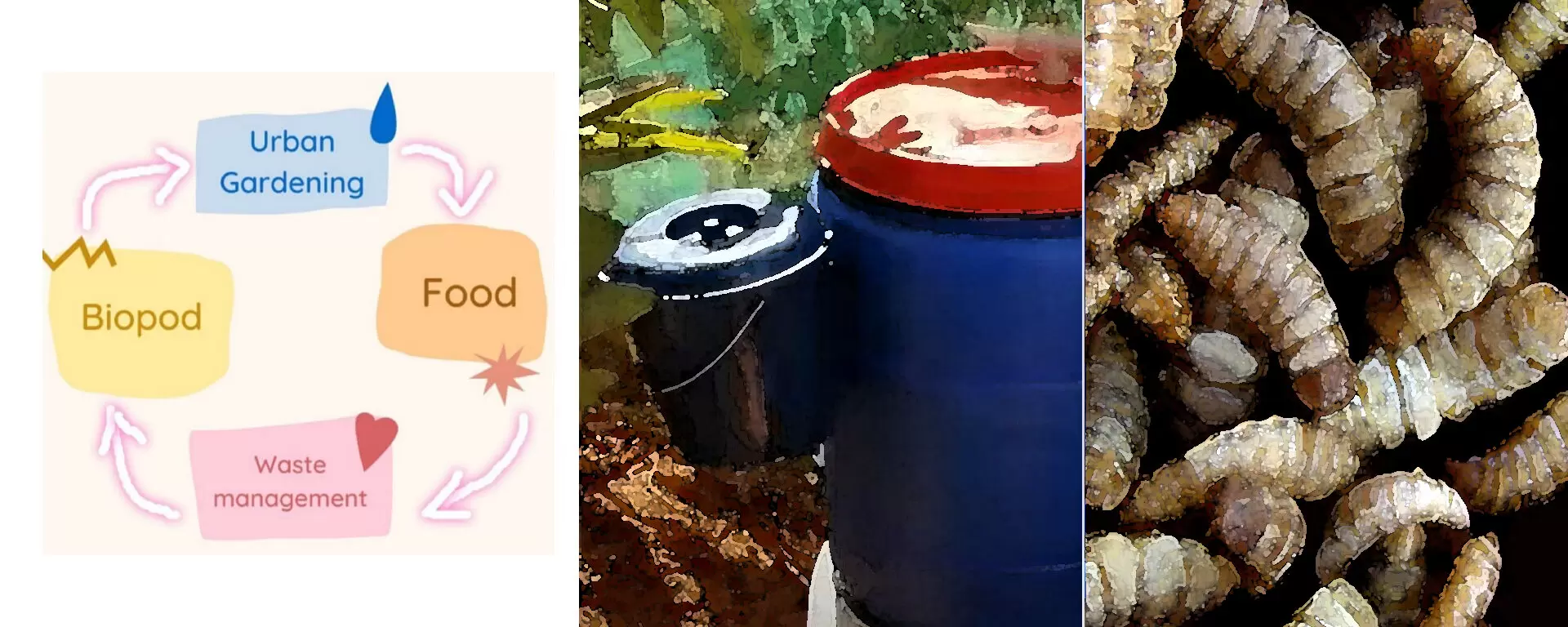
Solid waste management has always been an issue for developing countries. With urban India generating 62 million tonnes of waste (MSW) annually it is of no surprise that many Indian roads and streets have become the dumping grounds. It has been predicted that this will reach 165 million tonnes in 2030. 43 million tonnes of municipal solid waste is collected annually, out of which 31 million is dumped in landfill sites and just 11.9 million is treated [4]. Biopod is a solution to recycle organic waste.
A bird’s eye-view of the waste management value chain from the waste generator to the final contractor dumping the waste in landfills shows that the system is currently replete with perverse incentives that encourage waste dumping and burning, rather than environmental solutions such as composting, recycling and reuse.
Three major stakeholders are present in the waste management value chain: waste generator, waste collection agent and other middlemen in charge of collection and transportation, and the final contractor assigned to dump the collected waste.
With the country’s waste dumping sites running to be taller in height than national monuments like Qutub Minar and Taj Mahal it is high time we think about managing at least our degradable waste at our homes itself.
Collaboration with Switzerland
We compared the situations from Switzerland and India on the topic of urban gardening and biopods and realized how waste management is a major issue in India. We prepared a cycle which demonstrates how we can incorporate urban gardening at homes as well as manage waste more efficiently with the help of biopods.
The Contribution of our Swiss collaboration partners: Urban gardening
BIOPOD
‘Biopods’ or a type of a compost bin are set up at houses, poultry farms and fish farming centres. The system uses the larvae of Black Soldier Fly to decompose organic waste to usable nutrients.

Lets take a look at the Muhamma Grama panchayat in Alappuzha who implemented this method . the project will help families to generate income from the organic waste produced from their farms and houses.
It is cheap and can be installed anywhere with just two buckets and a couple of PVC pipes. The project is being executed at the Grama panchayat with the help of a Bengaluru based non-profit organization.
In the first phase, biopods have been distributed to as many as 63 poultry farm houses and fish farming centres.

One Black Solider Fly will lay 500 to 900 eggs and 2,000 larvae will eat 1kg organic waste per day. These larvae can also be dried and stored as dry matter, which can be directly fed to fish and poultry as an alternative feed.
While many compost bins can take 6-12 months to break down their contents, the BioPod™ can eliminate most of your food scraps in as little as 24-36 hours. Like composting and vermiculture, the BioPod uses beneficial grubs to digest and decompose your kitchen waste, while producing valuable finished products.
The specific bioconversion process by which valuable proteins and fats are captured and recycled, rather than degraded, into usable biomass/humus by a beneficial decomposer is referred to as Grub Composting. We can use the final product -the humus as an excellent manure for urban gardening.
Steps to make a biopod at home
Items required:
- two buckets a large one and a small one
- flex pipe abt 1 to 1.5 m
- 3 t-shaped pipes and 1l-shaped pipe
- few cycle screws
- tape
Steps to follow
- The culture is set up in the larger bucket, the larvae is collected in the smaller bucket
- Make a hole in the lid of the larger bucket and the smaller bucket. Fix a T pipe in the hole. Make a hole in the side of the larger bucket as the outlet, keep in mind the width of the flex pipe you are using
- Make smaller holes in the base of the larger bucket to let the water out
- Cut the flex pipe in half along its length,
- fix a T pipe in the side hole of the larger bucket
- fix both the ends of the flex pipe to the ends of the T pipe, fix the flex pipe in the bucket using screws to keep the pipe in place
- The fly tends to lay eggs in a decomposing environment ,we exploit this to our advantage by fixing paper straws around a small pipe securing it with insulation tape and fixing this to the inside of the lid of the larger bucket where earlier we placed a T pipe the fly lays eggs in the crevices of the paper straws and the larvae tends to fall into the flex pipe,the food waste we dispose in the larger bucket is consumed by the larvae
- It consumes the food for its whole life cycle during its larvae stage
- During its prepupal stage it stops consuming and requires a dry and dark atmosphere and so it travels through the pipe and reaches the collection bucket
- fix cotton pieces in the holes made in the base of the larger bucket to prevent the leakage of larvae
- For first use preferably use rice as the Black Soldier Fly is attracted to the rotting smell of rice
- The black soldier fly is completely safe and does not possess any threat to humans
- Tape the pipes to the bucket to fix it securely
- Now connect the outlet of the larger bucket to the hole of the smaller one using the L pipe and another pipe if required for length
- Your biopod is ready
Urban Gardening
The urban population living and employed in cities has to source their food supply from the market. As much as 70% of their income has to be spent on buying food. Thus they are vulnerable to the fluctuations in the market prices. To support this vulnerable population is a great challenge for urban Governance. In many parts, it is seen that the urban poor are utilizing vacant plots in the city to grow vegetables to enhance their income also.
India, being an agricultural country, urban farming has been a traditional activity at household level which has its origin in household kitchen-waste management. Thus we see great potential for farming lies just below the surface! Urban farmers have access to knowledge, emerging technology, and research in agriculture. Many have carried out highly successful experiments in growing fruits and vegetables under most constrained urban conditions. Citizens can create cleaner and better living environment especially in areas not receiving waste management service from Municipal corporations. Most cities today face acute problems in finding place for dumping waste resulting in air water & land pollution in cities & in bio regions. Examples of Ramsey site bio region Deepor Beel in Guwahati greatly disturbed due to dumping of garbage. [1]
Challenges
- Although studies have demonstrated improved air quality in urban areas related to the proliferation of urban gardens, it has also been shown that increasing urban pollution (related specifically to a sharp rise in the number of automobiles on the road), has led to an increase in insect pests, which consume plants produced by urban agriculture.
- The required Farming inputs are not available in appropriate quantity and time
- Space is at a premium in cities and is accordingly expensive and difficult to secure.
- The utilization of untreated waste water for urban agricultural irrigation can facilitate the spread of waterborne diseases among the human population.
Food
The traditional food of India has been widely appreciated for its fabulous use of herbs and spices.One must not forget that every single spice used in Indian dishes carries some or the other nutritional as well as medicinal properties. But the conventional lifestyle has led to the replacement of these healthy food with fast foods and instant meals. These faster options may be convenient but they also put a serious dent on our health. Today’s generation faces widespread issues as a result, such as diabetes, blood pressure, and obesity due to unhealthy food.
Problems associated with purchased foods.
The problem with mass-produced food is that it is often loaded with chemicals and pesticides to increase production and shelf-life. With urban gardening, you don’t have to worry about this. You can grow organic food without such chemicals. You have control over the growing conditions and the water, soil, and compost you want to use.
What are the benefits of home-grown food?
Growing your own food means you grow healthy, nutritious food like fruits, vegetables, and herbs. These are low in cholesterol, high in fiber, and have beneficial vitamins and nutrients. Urban gardening is one of the best ways to get healthy, nutritious food for your family.
You can choose to grow the unique heirloom varieties of food that are high-quality and delicious but may be susceptible to disease if mass-produced. You can pluck the fresh fruits and vegetables whenever they are ready for harvest, so you don’t need to worry about the shelf-life.
You can choose what you want to grow, how you want to grow it, and where you want to grow. This helps you get the food that you want, when you want, without always depending on the seasons.
Waste management
India generates 62 million tonnes of waste each year. About 43 million tonnes (70%) are collected of which about 12 million tonnes are treated and 31 million tonnes are dumped in landfill sites. [4]
With changing consumption patterns and rapid economic growth it is estimated that urban municipal solid waste generation will increase to 165 million tonnes in 2030. Approximately 90% of residual waste currently dumped rather than properly landfilled
In 2014 India inaugurated the Swachh Bharat Mission, a five-year nationwide cleanup effort. Before this national consolidated effort for systematic and total waste management came into common consciousness, many cities and towns in India had already launched individual efforts directed at municipal waste collection
Some examples are Swach based in Pune (formed in 1993), Clean Cities Championship in Warangal, Nirmal Bhavanam, Nirmal Nagaram or Clean Homes.
The main problems faced by India
Experts believe that India is following a flawed system of waste disposal and management.
The most efficient reform is to start from our homes. Unlike other developed countries, in India, the waste generator expects payment for waste, and hence the entire revenue flow is backward : the resident (or waste generator) gets payment from the local collector, who gets paid by middlemen, who finally get paid either by the government for dumping (called a tipping fee) or from the recycler for supplying raw materials for the recycling process.
The central government should create an appropriate national framework to incentivise and monitor implementation by the states.: Ultimately, to overhaul the waste management sector and induce the necessary behavioural change, citizen participation and engagement is the key. Building appropriate institutional framework along with policy-level directions will help facilitate the necessary change.
Experience
Even though we were unable to conduct in-person meetings for collecting information and conducting surveys,overall it was great experience .As our team members,Debora and Melane have already mentioned the time difference made it hard to meet through video calls but we managed it through chats.Even though there were few miscommunications and work lags, it was really a fascinating experience to have got the chance to work with such amazing people who are always open to ideas and questions.
Reshma Rajesh and Ashish P John,Team Kerala, India (Collaboration with Melane and Debora from Switzerland)
Sources
[1] Urban Farming – A Sustainable Model for Indian Cities (PDF, 2017); International Journal on Emerging Technologies, p. 236-242 (researchtrend.net)
[2] Survey and virtual meetings with local people and farmers from Kerala (6 people on August 21)
[3] Vellayani Farmers Producer Company (facebook.com)
[4] Waste management in India (wikipedia.org)
On-topic contributions on dontwastemy.energy
Urban gardening (Swiss collaboration partners)
Urban gardening cities – top or flop?
Organic Waste – Problems and Solutions
Living vegan
☷ See the project teams here »
☵ Some words about the contributions »
☴ Our sponsors and partners » (the-horse.education)

So wonderful. It is today’s need and makes waste management so easy.
Hope this is implemented in every State and the incredible work you guys have done is appreciated and implemented.
Wishing you’ll great successes in future.
Excellent way of doing organic farming
Nice. Well explained.